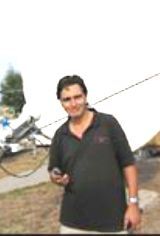South Sudan’s mobile phone network revolutionizes
RUMBEK, Sudan, Jan 24 (AFP) — Rumbek, the provisional capital of south Sudan, may lack running water and electricity, but a boom in mobile telephony and Internet access has given its population of 30,000 something to talk about.

|
|
CELL MAN: Californian Richard Herbert, in Rumbek (photo CSM) . |
Before mobiles and cyber space, Rumbek had little contact with the outside world.
Only a few leaders of the rebel Sudan People’s Liberation Movement (SPLM) carried satellite telephones, a luxury that locals could not afford. Otherwise the only contacts were with other areas controlled by the rebels or with neighbouring countries via commercial high frequency radio.
The town still has no regular telephones.
Nevertheless, two public Internet cafes have opened and Network of the World (NOW), a Sudanese-owned company based in Rumbek, began operating a mobile telephone network last year.
Despite some drawbacks, the advent of mobile telephony has been revolutionary.
“When we decided to come here, we were not even sure we could get cement or bricks,” Richard Herbet, operations director for NOW told AFP.
Working out of the bombed-out telecommunication facility, the project got underway in mid-2004 and mobiles began ringing in Rumbek by the year-end.
Herbet says there are some 1,000 subscribers between Rumbek and Yei, a town on the Sudanese-Ugandan border, where NOW, the only mobile provider in rebel-controlled areas of the south, has also set up shop.
“It has improved communications and business,” said Taban Emmanuel, a market trader and NOW subscriber. He uses his handset to conclude business deals, keep track of price fluctuations across the border and stay in touch with his family in Yei.
“Things are better now,” he said.
However, subscribers can only buy those phones provided by the network, many of them old and faulty. Although they can receive calls from overseas, they cannot be used to dial international numbers.
This has discouraged many, such as market trader Peter Lado from signing up. Instead, he continues to use high frequency radio, which costs about one dollar for five minutes, to run his business and communicate with family members.
“Sometimes there is a queue at the radio room and I have to wait for a long time, but it works and I get responses,” Lado said.
Herbert conceded the system was not perfect, saying it was in the process of being upgraded into a fully fledged GSM network.
The telephones, which cost 60 dollars, are currently routed through North America on a non-GSM-based system.
“They gave me an old phone,” Izaru Alfred complained. He said the handset did not work properly and the battery went flat after only a few hours.
Alfred had his handset replaced twice and, when he did not get better results, he gave up and demanded a refund, which he got.
NOW’s Herbet promised that once the company upgrades the system, “customers will get new phones”.
He dismissed complaints from some clients that their calls were automatically disconnected after 22 seconds and insisted that the network’s range of around 12 kilometres (seven miles) was reasonable.
NOW plans to open 10 facilities across south Sudan by the end of 2005 but still has some way to go in convincing Lado and others to sign up.
